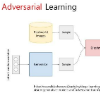Simultaneous segmentation and detection of liver tumors (hemangioma and hepatocellular carcinoma (HCC)) by using multi-modality non-contrast magnetic resonance imaging (NCMRI) are crucial for the clinical diagnosis. However, it is still a challenging task due to: (1) the HCC information on NCMRI is invisible or insufficient makes extraction of liver tumors feature difficult; (2) diverse imaging characteristics in multi-modality NCMRI causes feature fusion and selection difficult; (3) no specific information between hemangioma and HCC on NCMRI cause liver tumors detection difficult. In this study, we propose a united adversarial learning framework (UAL) for simultaneous liver tumors segmentation and detection using multi-modality NCMRI. The UAL first utilizes a multi-view aware encoder to extract multi-modality NCMRI information for liver tumor segmentation and detection. In this encoder, a novel edge dissimilarity feature pyramid module is designed to facilitate the complementary multi-modality feature extraction. Second, the newly designed fusion and selection channel is used to fuse the multi-modality feature and make the decision of the feature selection. Then, the proposed mechanism of coordinate sharing with padding integrates the multi-task of segmentation and detection so that it enables multi-task to perform united adversarial learning in one discriminator. Lastly, an innovative multi-phase radiomics guided discriminator exploits the clear and specific tumor information to improve the multi-task performance via the adversarial learning strategy. The UAL is validated in corresponding multi-modality NCMRI (i.e. T1FS pre-contrast MRI, T2FS MRI, and DWI) and three phases contrast-enhanced MRI of 255 clinical subjects. The experiments show that UAL has great potential in the clinical diagnosis of liver tumors.
翻译:NCMRI信息不为人知或不足,使得肝肿瘤提取工作难上加难; (2) 多式NCMRI成像特征的多种成像特征难以整合和选择; (3) 肝功能瘤和肝细胞细胞癌(HCC)之间没有具体信息导致肝脏肿瘤检测困难。 在本研究中,我们提出一个联合对抗性学习框架(UP ) 用于同时肝肿瘤分解和检测,使用多式NCMRI。 但是,由于以下原因,这仍是一项具有挑战性的任务:(1) NCMRI HCC信息不为人知或不足,因此难以提取肝脏肿瘤; (2) NCMMRI多式成像和肝细胞细胞细胞细胞癌; (3) 在NCMRI上, hemangiom 和HCC 之间没有具体信息导致肝脏肿瘤检测困难。



